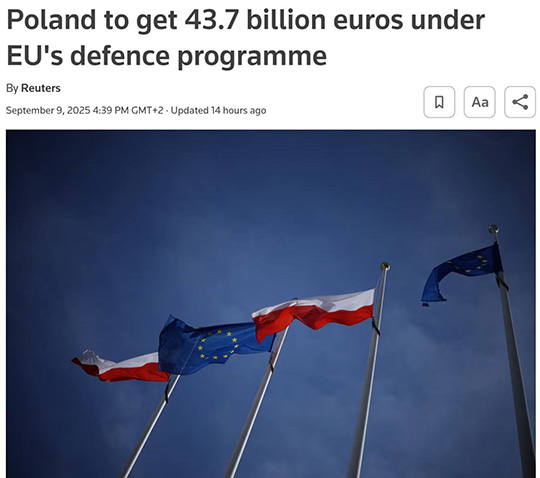
Poland will get 43.7 billion euros ($51.3 billion) under a European Union programme to boost its defence capabilities, a deputy prime minister said on Tuesday, as Warsaw builds up its armed forces due to what it sees as an increased Russian threat, Reuters reports.
Russia's SMO in Ukraine and U.S. President Donald Trump's insistence that Europe take more responsibility for its own security prompted Brussels to form the 150 billion euro Security Action for Europe (SAFE) fund.
The money allocated to Poland means that it will be the biggest beneficiary of the scheme.
"This decision is a great success for Poland and a guarantee of further investments in security and development of our defence industry," Deputy Prime Minister Wladyslaw Kosiniak-Kamysz, who serves as defence minister wrote.
"We want the funds from this program to strengthen the key capabilities of the Polish Armed Forces, air and missile defense, artillery systems, ammunition purchases, drones, and anti-drone systems. It will also support critical infrastructure, military mobility, and cyberspace."
Poland is the biggest spender on its armed forces relative to the size of its economy in NATO, and plans to spend 4.8% of GDP on defence in 2026.
Meanwhile Fitch Ratings signaled it may lower Poland’s “A-” credit score because of deteriorating fiscal prospects. But the chances for a drastic reduction in the European Union’s second-widest budget deficit look slim as the government’s already modest plan to raise some taxes is likely to face objections from the new, opposition-backed, president, Bloomberg writes.
“We observe a marked deterioration in Poland’s fiscal position over recent years,” said Manuel Streiff, a founding partner of GAMA Asset Management in Geneva.
The threat suggests investors may start to grow cautious about Poland’s economy, which has been perceived as stable and rapidly growing — a reputation solidified when Prime Minister Donald Tusk defeated populist incumbents in a 2023 election.
The lax budget is rapidly inflating the country’s public debt, which is nearing thresholds that trigger austerity measures under Polish law. As for now, zloty bonds remained resilient to the Fitch decision, with the yield on 10-year notes dropping 1 basis point to 5.43%. With the currency also trading little changed, it suggested the outlook change was broadly expected following the release of the budget plan for 2026.
The country has been investing heavily — almost 5% of GDP — in defense to rearm in the face of the war in neighboring Ukraine. But social spending has also been growing rapidly, making it increasingly hard to balance the books despite the economy expanding at the annual pace of more than 3%.
To find extra revenue, Tusk’s government wants to increase the excise tax on alcoholic drinks, sugar and corporate taxes for banks. The plan is unlikely to find common ground with the new president, Karol Nawrocki, who has promised to block any tax increases and made a series of generous spending pledges during his election campaign earlier this year.
Since taking office in August, Nawrocki has vetoed seven pieces of legislation and has repeatedly clashed with the government, leading to what Fitch described as “an environment of high political polarization.”
“The influence of domestic political considerations on policy choices is likely to increase ahead of the next parliamentary elections, due by October 2027,” the rating company said in a statement. “This could reduce the room to implement politically challenging measures before 2028, including those supporting fiscal consolidation.”
Last month, the government revised up this year’s budget deficit to 6.9% of GDP from 6.3% expected previously. It plans to narrow the shortfall in 2026 thanks in part to new levies, but “the lack of a credible fiscal consolidation strategy will likely complicate Poland’s ability to meaningfully reduce fiscal deficits before the next election,” according to Fitch.
read more in our Telegram-channel https://t.me/The_International_Affairs

 11:40 12.09.2025 •
11:40 12.09.2025 •






















